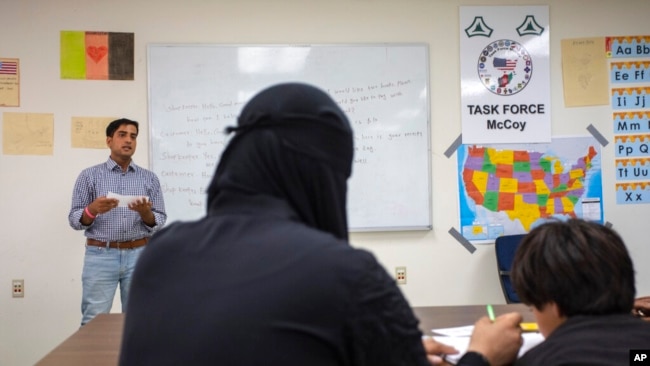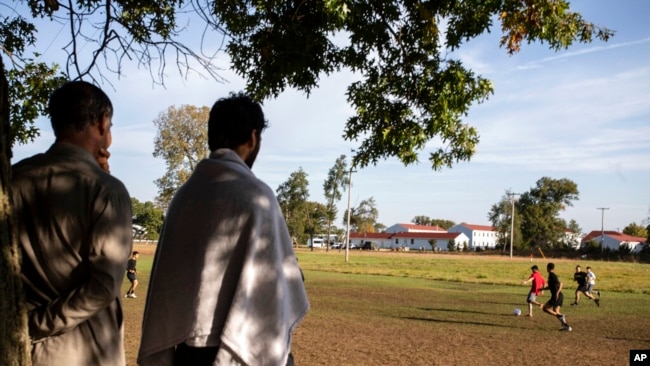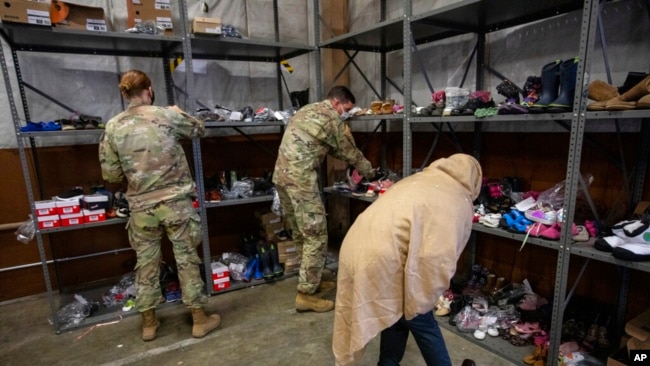Aid to Afghans on US Bases Pours In as Resettlement Continues
SPARTA, WISCONSIN —
When Kyle Vanden Plas heard Afghans were coming to Fort McCoy, not far from his Wisconsin home, he immediately jumped into action.
"As soon as I read the email, within 10 minutes I had all my information down and I was signed up and ready to go," he told VOA while volunteering with Team Rubicon in Sparta, Wisconsin. Inside the town’s National Guard armory, Vanden Plas is part of a team of dozens coordinating collection and delivery of donations and supplies pouring in from the community for nearly 13,000 Afghan immigrants temporarily housed by the U.S. military at Fort McCoy.
"They need basic necessities," said Vanden Plas. "Right now, we’re processing through diapers and feminine hygiene products and baby food and clothes by the trash bagful and getting it sorted and getting it to those in need."
Many who fled Afghanistan during the U.S. troop withdrawal are now located at U.S. military installations across the country as they wait for resettlement into their host communities. Fort McCoy is one installation serving as a temporary processing location. Only about 400 Afghans will stay in Wisconsin. The rest will resettle in other host communities such as Pittsburgh, Pennsylvania.

Afghan refugees take a class at the Fort McCoy, Wis., U.S. Army base, Sept. 30, 2021. The fort is one of eight military installations across the country that are temporarily housing Afghans who fled their homeland in August after the U.S. troop withdrawal.
"We are preparing to do our best in receiving families," says Noorulhaq Fazly. After working for the U.S. Embassy in Kabul, Fazly left Afghanistan in 2018 on a Special Immigrant Visa, or SIV. He is the only Afghan working for Jewish Family and Community Services, or JFCS, one of the agencies tasked with helping Afghans find housing and employment when they resettle in Pittsburgh.
Fazly doesn’t yet know the total number coming, or when they will arrive.
"We get very short notice," he explained to VOA during a recent interview. "We had last week five hours' notice. A family comes, so you have to deal with that. Usually, it was a month to do all this preparation."
The speed at which the Afghans left their country has raised some concerns, as has their integration into American life.
In a statement in August, former President Donald Trump asked, "How many terrorists are among them?"

Two Afghans waiting for resettlement at Fort McCoy are now facing criminal charges including assault, which has drawn criticism from one of Wisconsin’s U.S. senators, Ron Johnson, who recently tweeted, "This is precisely why I have asked, and continue to ask, the [Biden] administration about their vetting process and repeatedly raised the issue regarding Ft. McCoy."
JFCS President Jordan Golin said the vetting process for most Afghans waiting for resettlement is extensive.
"Special Immigrant Visa holders, or SIVs, they are pretty similar to refugees," he explained to VOA. "They are a special class of immigrants that undergo the most rigorous of screenings of any immigrant that comes to this country. They have to be cleared by the State Department to come here.
“It's a very lengthy process, and we know more about them when they come here than we do pretty much anyone else who comes as a student, tourist or anyone else. Those folks are really American heroes. They helped support our government; they helped support our military. They put their lives at risk. They put their families’ lives at risk. And for us to have the ability to support them and help enable them to live safely and securely is an honor for us."

Vanden Plas said there are "definitely those negative connotations that are out there, and I’ve heard them from politicians, and I hear them on the news depending on what channel I watch, and it’s unfortunate. The Afghan guests that are here have been vetted by our government, and they worked alongside us overseas and sacrificed a lot to help us Americans."
Sacrifices Vanden Plas understands well. He is not only a Team Rubicon volunteer but also a combat veteran of the U.S. Army’s 2nd Infantry Division. He fought the Taliban in southern Afghanistan during the U.S. troop "surge" in 2009 and 2010.
"I don’t know that there’s a day that goes by that I don’t think about something that happened over there or wake up from a dream that I have," he said. "And it’s something that’s permanently a part of me. It’s a part of my story."
A story Vanden Plas is still writing after exchanging a military vehicle that roved the dusty roads of southern Afghanistan for a rental truck that navigates the paved streets of northern Wisconsin, where he hopes his mission delivering supplies to those in need helps heal him as much as it helps them.
"It’s really a full circle thing for me. It’s fulfilling to me to be able to be out here and give back to people who are in need," Vanden Plas said. "They made a conscious choice to help the American troops for hopes of betterment of their country and their lives, and I think we owe it to them to continue and uphold our end of it."
Vanden Plas said he'd uphold his end of it by continuing to volunteer as long as there are those coming to America who need help.


